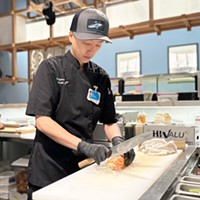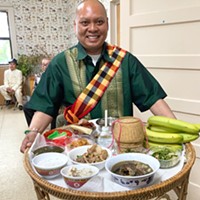Looking Out for Each Other
Organizations team up to feed Lao and Hmong community members in need
By Jennifer Fumiko Cahill [email protected] @jfumikocahill
Photo by Jennifer Fumiko Cahill
Volunteers, including students from Alice Birney Elementary School, load food into the trunk of a driver delivering to multiple households.
[
{
"name": "Top Stories Video Pair",
"insertPoint": "7",
"component": "17087298",
"parentWrapperClass": "fdn-ads-inline-content-block",
"requiredCountToDisplay": "1"
}
]
A little after 9 a.m. Saturday, Jan. 22, the curb of Alice Birney Elementary School in Eureka is lined with boxes of food: sweet rice, fish sauce, leeks, eggs and tied bags of greens. Sacks of rice are piled on a pallet and cases of Mama noodles stack up shoulder high by the fence. A dozen or so volunteers are checking lists, counting packages and preparing to shuttle food to car trunks.
Thavisak "Lucky" Syphanthong is, to no one's surprise, live on Facebook, smiling as he pans his phone to film the scene and narrate the effort. The day's food distribution, getting culturally appropriate staple foods to some 60 local Lao and Hmong households, is a joint project between the NorCal Lao Foundation, New Rising Hmong Association, Redwood Coast Regional Center and Food for People.
It's Nor Cal Lao Foundation's second food distribution. The first was in May of 2020 with funding from the Humboldt Area Foundation ("Rice Sacks and Blessings," May 7, 2020). This time, the group was approached by Jennifer Garcia of the Redwood Coast Regional Center, which had conducted a similar operation in Del Norte County with the Hmong Cultural Center there and offered the foundation $3,000 to help purchase food. "They have services that don't reach our community," says Syphanthong, a board member of NorCal Lao Foundation, who says language can be a barrier to both aid and information, particularly for elders in these communities.
"We kinda look out for each other, especially our elders," she says, explaining that sometimes means calling or Facetiming with their adult children to share information about COVID-19 safety so they can translate for their parents. Otherwise, little official information reaches them in their native languages beyond what they find on YouTube and from abroad, neither of which are necessarily reliable.
"Everything is word of mouth," says fellow board member Ampha Mannorind. That can make it hard for outside organizations to connect with Lao and Hmong communities. "I reached out to families, primarily the seniors," most of whom she already had on her list from the previous distribution. Just then, an older couple emerges from a car and she jogs off to translate for them.
In her stead, Syphanthong continues, "We identified the families most in need. New Rising Hmong took care of the Hmong side and NorCal Lao took care of the Lao side. ... The new generation, we work together."
Mai Cheng and Yanli Yang, who founded New Rising Hmong with Christina Vang this past year, are also translating and checking off family names on their lists. "Our goal is to reach out to the Hmong community and provide them resources on health," says Yang. So far, that's included bilingual announcements, translations on Zoom and a domestic violence program in October of 2021. They've brought bags with Hmong language health information to hand out along with the food.
Getting the food amid supply chain shortages and price increases (the cost of a basic bottle of fish sauce has risen to $9.99) presented its own problems, mirroring some of the same issues local families face getting food. Volunteers ordered some items weeks in advance and purchased as much as they could from locally owned shops, including Little Japan, Asia's Best, Oriental Food and Spices and Lao Oriental Market. Still short on rice, Pang Lo and her husband Pheej Her went to Costco for the last 30 bags.
"My husband had to push the cart," says Lo, laughing as Her pantomimes angling himself at 45 degrees to move 700 pounds of rice. It drew curious glances in the store, she says, but they're thankful it all fit in their truck. They're also grateful to be able to distribute from the lot of Alice Birney Elementary School, where Lo is president of the PTA. Students volunteers were on hand helping haul bags and boxes, too.
Garcia also reached out to Food for People, where Emergency Food Response coordinator Robert Sataua organized some 600 pounds of fresh local produce, including eggs, funded by Locally Delicious and another 900 pounds of nonperishable items from the food pantry. Sataua has been working with Alice Birney Elementary, running distributions to get food to those affected by wildfires this year, as well as working with the Wiyot Tribe and Bear River Band of the Rohnerville Rancheria to feed those in need.
"This group is kind of similar," Sataua says, "in that we haven't been reaching them." Food for People, he adds, is up to do more with Southeast Asian communities in Humboldt in the future.
Garcia, absent from the event, had sent her regards through her assistant Dolores Delgado, who set up a Redwood Coast Regional Center tent and was distributing information packets. What no one knew at the time was that on the day of the event, Garcia was struck by a car while walking and badly injured. On Jan. 30, her family posted an update on a Gofundme page set up for her recovery stating that she had died of her injuries. A coworker at the RCRC office said a stack of Hmong language pamphlets Garcia had ordered arrived shortly after news of her death. She was in the process of tracking down the intended recipients to finish Garcia's task.
The day of the distribution at Alice Birney, another woman's absence was keenly felt among some of the volunteers — Oneta Sayavong, who went by Auntha and was one of the founding members and a driving force behind NorCal Lao Foundation as it grew from a traditional dance group into a cultural preservation and community organization, had died in March of 2021. Already ill during the first food distribution in 2020, her death stunned the close group. This was the first event the members had put together since losing her.
"We were so devastated by that," says Syphanthong, noting how strange it still is without Sayavong, who was such a fixture in the community. It was hard to start again but when Garcia reached out with the offer to help, he and his close-knit group rallied and got to work. As someone slips by him to grab boxes of noodles for someone picking up food to deliver to three households, he waves a hand toward the boxes and the people. "She would want us to do this. She's all about the community."
Jennifer Fumiko Cahill (she/her) is the arts and features editor at the Journal. Reach her at 442-1400, extension 320, or [email protected]. Follow her on Twitter @JFumikoCahill.
Speaking of...
-

Chef Pangnou Vang Behind the Counter at Sushi Blue
Mar 21, 2024 -

Burgers, Backpacks, Media and Weekend Recs
Sep 22, 2023 -

Food for People Starting a New Chapter
Jun 24, 2023 - More »
Comments
Showing 1-1 of 1
more from the author
-
SCOTUS on the Homeless, CPH Protest and Local Entertainment
- Apr 26, 2024
-
Look Up for Rooftop Sushi
- Apr 19, 2024
-
Resentencing, CASA Kids and Freaky Fish
- Apr 19, 2024
- More »


































